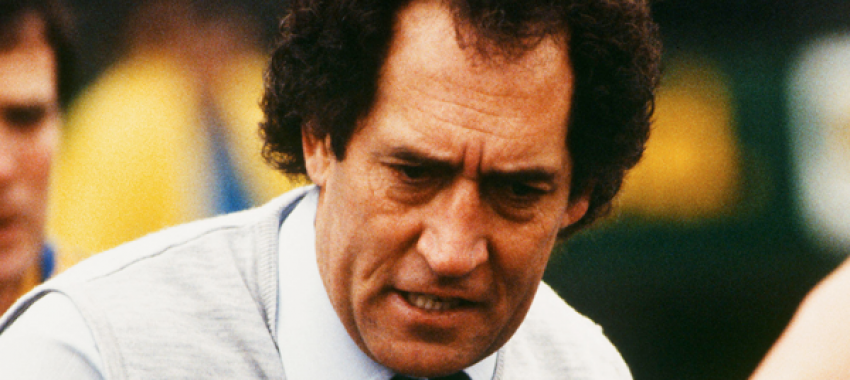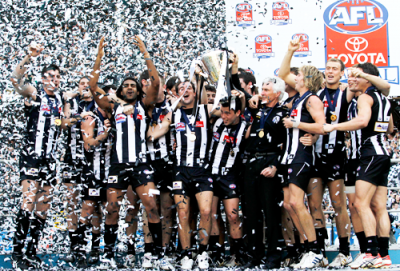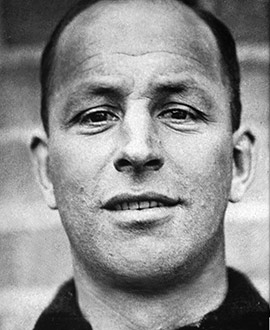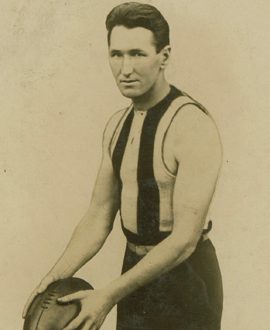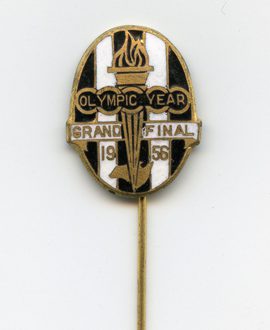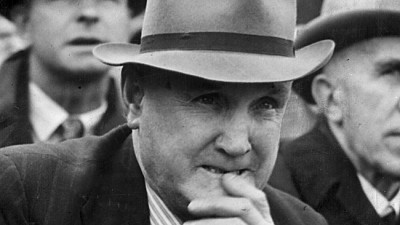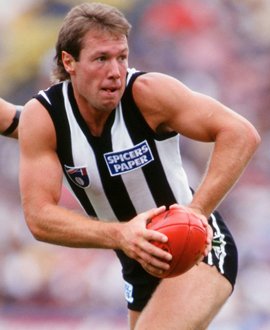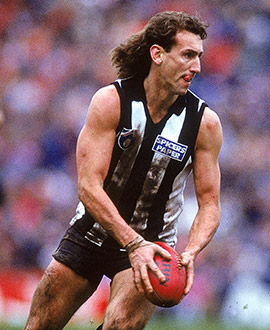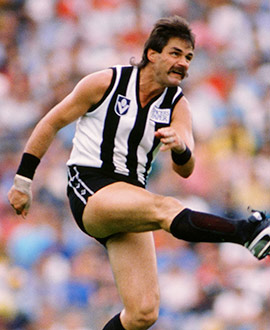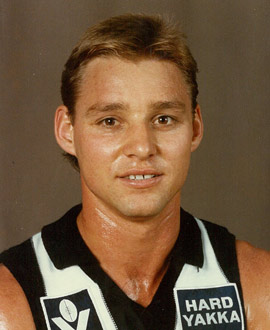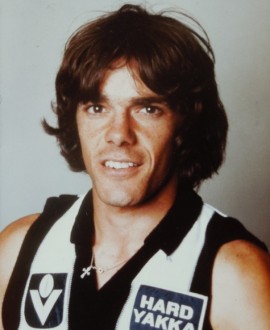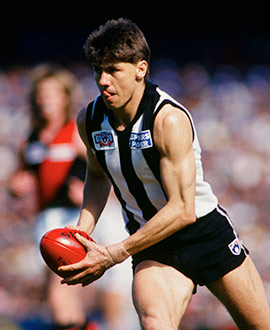Imagine having access to the best seat in the house every second weekend.
Well, through (almost) the best of times, and (almost) the worst of times, that's the vantage point from which I was able to watch Collingwood's decade of excess - the '80s.
Much of my teenage Saturday afternoons were spent on the splinter-ridden, faded seats at Victoria Park, cheering and cursing, depending on the scoreboard and the opposition.
It wasn't privilege that gifted me the seat, even though I liked to imagine as a wide-eyed (or maybe one-eyed back then) 13-year-old that the grandfather that I never knew and who had died nine years before I was born, might have had something to do with it.
His name was Charlie Dibbs, and he had played in five premierships and 216 games for the Magpies.
The reality was that it was pure chance.
After having attended many earlier games at Victoria Park, and elsewhere, I was able to secure a more permanent seat with a few mates of mine in early 1982. And what gob-smacked us all was that the club offered to let us lock in three seats immediately over the Collingwood players' race.
We had front row seats to one of the most divisive seasons in the club's history. The on-field action sucked, but the drama made for compelling and almost compulsory viewing.
If memory serves me correctly, the first game we had access to those seats was Round 3, 1982. We lost to Carlton, the team that had beaten us in the previous year's Grand Final.
But even defeat was a little easier to take (only just ...) because we felt a part of the inner sanctum - the reserves players sat behind us - and it made up for some of the losses.
Still, it didn't quite make up for the eight successive losses that started that day, and which culminated in one of the greatest footy shocks I'd ever experienced at that stage.
Tom Hafey, the man in the extra-tight T-shirt, was sacked not long after the inexplicable loss to Melbourne in Round 10 - 11 games since he had coached in a Grand Final.
Tommy sacked? It seemed like a bad joke reserved for the Tigers, not for the Magpies.
Bad news travelled in more traditional vehicles back then. For me, it started with a radio newsbreak and became real when my mum picked up a copy of the Herald newspaper. Then the TV networks confirmed it all. In those pre-Twitter days, the only form of expressing an opinion came in writing a letter of complaint to the club that I never sent.
As a protest, I refused to unpin my 'Hafey's Heroes' badge from my duffle coat for the following game – a big win over St Kilda at Vic Park under caretaker coach Mick Erwin.
Badges said a lot about young Magpie fans back then.
Mum used to give me some extra cash - $1 and $2 were notes, not coins back then - so I could buy a few badges every week. It was always fun trying to find the more obscure ones, though I never did manage to find a Wally Lovett one.
At one stage my coat was filled with so many badges that it seemed to put me in the same weight bracket as Rene Kink, whose badge was always one of the most supplied at the souvenir stalls.
The No.25 was emblazoned across the back of my duffle coat then was in honour of Billy Picken, that high-flying, tongue-flapping centre half-back. At half-time of Victoria Park games, we would rush to the other side of the ground, get a pass-out and play kick-to-kick on the grass that backed onto the Rush Stand, all pretending to be flying as high as Billy.
Or using the ball as deftly as Peter Daicos.
1982 was the year Daicos - who hailed from Preston RSL, not far from my home suburb of Kingsbury - won his first Copeland Trophy. It was the year I put Daics' No.35 on the left-hand pocket of my duffle coat. Within a year it would be upgraded to the back. For some reason I put Craig Davis' No.19 on the other pocket, though in hindsight I reckoned it should have been 'Choco' Williams' 21.
By the end of that year Collingwood was on the verge of imploding after dropping to 10th. The coaching change did nothing to bring about a change of fortune and two more shocks came from the ill-feeling and dissention sweeping that season.
The first was when Peter Moore quit the club and accepted a massive offer to move to Melbourne. And for the record, I was definitely NOT the one holding up the “Moore Filth” banner when we met the Demons in Round 1 in 1983.
The second was when the club had a board revolution, with the so-called New Magpies, led by Ranald Macdonald, winning an election and promising a premiership. Well, I'm not totally sure they did promise it, but it felt that way and we believed it - for a time.
John Cahill, the Port Adelaide coaching great, took over the reins, and the New Magpies embarked on one of the biggest recruiting sprees the game has ever seen. We recruited the likes of David Cloke, Geoff Raines, Michael Richardson as well as a bloke called Gary Shaw who was known much more for his transfer fee (more than $300,000) than for his talents.
But not all the changes were welcomed.
Who will ever forget the decision in 1983 to change the most famous theme song in Australian football? To cover up for the club's inability to win a premiership for a generation, they opted to take out the "Oh, the premiership's a cakewalk" line and change it to "There is just one team we favour." It wasn't Mike Brady's best work.
It was never accepted and the fans put the pressure back on the club to change it back, which they did.
As much money as the New Magpies spent – it did take the club to the brink of bankruptcy about three years later – it didn’t buy a premiership.
But there were some successes, mainly in 1984, when the Magpie faithful enjoyed some high moments.
We made the finals for the first time since 1981; those of us who ventured out to the Western Oval that year were treated to Denis Banks' remarkable, horizontal speckie; a kid called Darren Millane played his first game; and we had exciting wins over Fitzroy and Carlton in the first two weeks of the finals.
But for every good moment, there had to be bad ones, and few were as crushing as the 133-point loss to Essendon in the preliminary final. It would be Cahill's last game as coach. Bob Rose would step into the breach for 1985, but sadly it didn’t give one of Collingwood’s favourite sons what he deserved – a flag.
The following year, 1986, marked a different experience for me, and for the club.
From the club's perspective, the New Magpies' greed is good philosophy - chasing the most expensive recruits they could find - meant the money ran out, and Macdonald was forced to resign. Into the breach stepped Allan McAlister, and in the same week that Rose stood down in favour of assistant coach Leigh Matthews, a new era was born at Vic Park.
I was lucky enough to hold onto my seat above the race that year, but I was also invited to train with the Collingwood under 17s, known as the Harry Collier Squad.
And in one forgettable session at Vic Park, this now 17-year-old schoolboy had the privilege of throwing up in front of the new senior coach, who had come down to watch us.
Maybe my card was marked then, but it didn't really matter. Although I was lucky enough to play a handful of matches for the Collingwood under 17s on Vic Park, I was always destined to be more of a fan more than footballer.
There were far better colts coming through the under 19s that year who would soon become Magpie household names. For as much as Collingwood was reasonably competitive, the likes of Gavin Brown, Gavin Crosisca, Damian Monkhorst and Mick McGuane gave hope for the future.
We didn't know it at the time, but that class of '86 was a rare crop.
Seventeen players (yep 17) - the most for Collingwood since 1933 - made their debuts in 1987, and while it was a miserable year on the field, all the fans hoped we were building.
There were signs of it in 1988, when we finished fourth, but couldn't win a final, and fifth in 1989, when lost yet another final.
As the decade came to an end, it was hard to tell how close we were to ending that long premiership drought.
No one realised just how close we were to finally singing with gusto that famous line from the theme song - 'Oh, the premiership's a cakewalk."
Without the mullets and the moustaches, and all the other excesses of the '80s, that famous 1990 flag would never have occurred.
And I wouldn't have stumbled around the darkness that wild, wild night back at Victoria Park in October 1990 looking for the seat that used to be mine.


